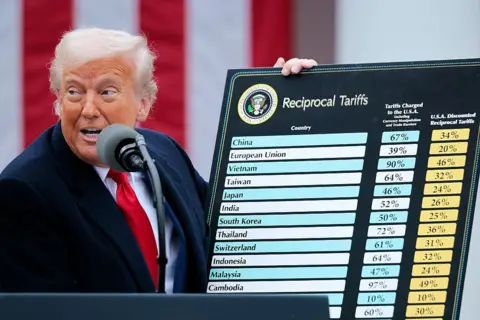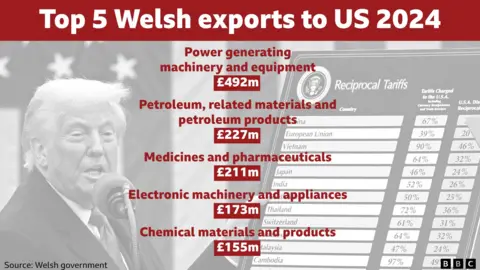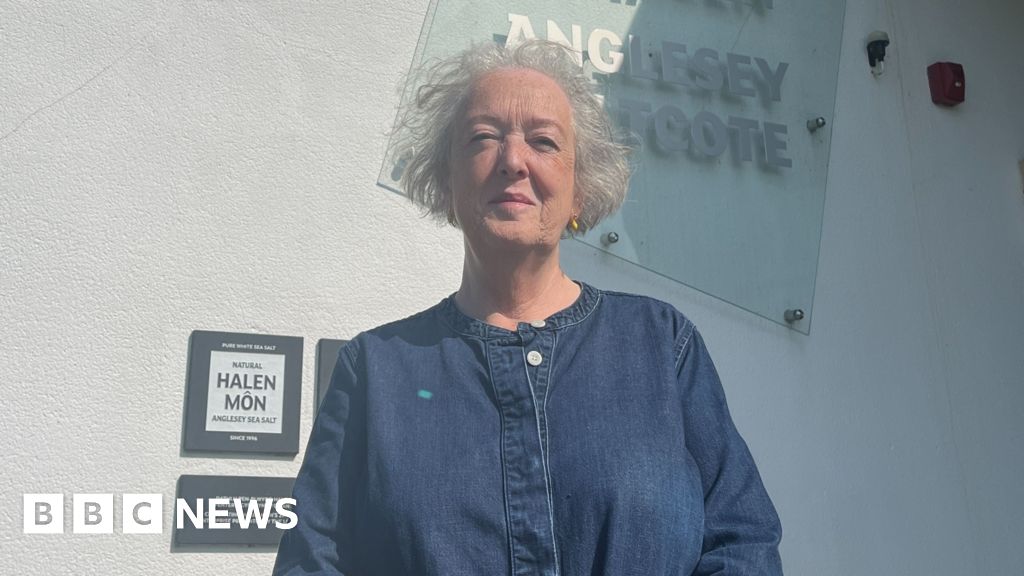Donald Trump’s new 10% tariffs on all imports to the United States could spell the end of one Welsh company’s sales there, its boss has said.
Anglesey-based Halen Môn has been exporting salt to the US since 2000, its managing director Alison Lea-Wilson said.
But the company’s products already cost two or three times more there than they do in the UK, she told BBC Radio Wales Breakfast.
Halen Môn’s salt goes through an importer, a distributor, a wholesaler and a retailer before it reaches the US consumer, and to add another 10% might be “the straw that breaks the camel’s back,” she added.
Trump announced a 10% tariff on all imports from the UK and many other countries from 5 April which he said was necessary to protect American jobs and manufacturing.
Companies that bring the foreign goods into the US have to pay the tax to the government, but it could also affect consumers if those costs are passed on in the form of higher prices on the shelves.
 Getty Images
Getty ImagesMs Lea-Wilson said Halen Môn’s distributor told her they were “very upset” and were taking legal advice to see how they could help her business.
“It’s very painful, on a personal level, because some of our customers are now friends,” she said.
One of the company’s proudest moments came when Halen Môn was used on chocolates which were President Obama’s favourite.
“He used to give them to all his visitors at the White House,” Ms Lea-Wilson said.

In 2023, the US became Wales’ highest-value export market, accounting for £2.9bn, or 15%, of exports – mainly machinery and transport equipment.
Prof Max Munday from Cardiff University’s Business School said the tariff structure would bring an increase in costs for Welsh manufacturing through the supply chain.
He also expects Welsh businesses that export to the US to see higher costs due to more regulation and administrative requirements.
“This announcement will reduce confidence. It will increase uncertainty and I think it will hit business investment decisions,” he said.
But the US market will continue to be important for Welsh companies, he added.
One of Wales’ leading entrepreneurs Alan Peterson has run companies across the UK, Europe and north America and said indiscriminate global tariff enforcement was a “brainless policy”.
“I can only hope it is a sledgehammer attention-grabbing move which then settles down to more specific targeting in the months ahead,” he said.
He argued that US productivity had been poor across numerous industries for a long time, which is why imports had thrived.
“If this is not tackled by Trump, then home prices will remain uncompetitive,” he said.
John Hurst from the Federation of Small Businesses in Wales said the tariffs posed “an immediate challenge” for Welsh small businesses exporting to the US, adding that the potential damage was “significant”.
“The scale of this emerging challenge necessitates targeted support from the Welsh government, including resource for Business Wales to expand their trade advisory services to provide guidance on navigating these new trade barriers and diversifying markets,” he said.
Wales cabinet secretary for economy, energy and planning, Rebecca Evans, said tariffs were “a matter for UK government” but added the Welsh government was concerned about the potential impact.
“We have been speaking with UK government ministers, unions and the business community about the issue with urgency, and we will ensure the right support is available for Welsh businesses, initially through Business Wales,” she said.
Analysis – Huw Thomas, BBC Wales business correspondent
A worrying period has begun for Welsh businesses as the shockwaves from President Trump’s new tariffs will touch far more than those companies who export goods to the United States.
And yet there is a sigh of relief from some who feel the UK escaped lightly – compared to our biggest trading partner, the European Union – by receiving a tariff of 10%.
It’s little comfort to some specific sectors of the Welsh economy. The existing tariff of 25% still applies to metals imported to the USA, such as steel and aluminium.
There’s also a threat to Welsh firms in the car parts supply chain, which is expected to feel the impact of the new 25% tariff on vehicles.
‘”Keep calm” is the mantra from the UK government as it considers how to respond to the new American tariff regime.
It’s a mantra that business leaders appear willing to accept for the time being.
While there’s a wait-and-see element to the impact of the tariffs, businesses already know that any additional cost or complexity is a barrier to growth.
There are also broader concerns about the re-routing of goods which, faced with US tariffs, may enter the UK market and undercut local suppliers.
While the tariffs will be paid by businesses to the US, the impact of higher costs will be felt ultimately by consumers on both sides of the Atlantic.
‘Specialist products will sell’
Bosses at Newport-based company Tomoe Valve, which makes high performance butterfly valves that are used in a wide variety of projects all over the world, are less concerned.
The firm hit £6m in sales in 2024-25, and its biggest order worth £1.2m ($1.6m) came from the US – a huge valve for a battery plant.
Financial Director Denise Cole said she does not want tariffs on her products, but understands why President Trump has brought them in.
“I’ve seen UK manufacturing decimated and the same has happened in America so he’s looking after his own, which is exactly what it says on the tin with Trump,” she said.
She said there was a lot of panic over tariffs, but any changes could be “short-lived”.
“I really don’t think it’s going to impact us in a negative way,” she added.
“The specialist products we sell, they don’t manufacture in the US anyway, they would struggle to get them elsewhere.
“Our own government has done me more damage by increasing employer National Insurance Contributions.
“That’s added £35,000 to my costs – that’s a whole person’s wages. I would have taken on a new member of staff this year as we have some big orders but I won’t be able to now.”
The Treasury has previously said it was delivering the stability businesses need to invest and grow.
Patrick Dodds from Hexigone Inhibitors from Baglan, Neath Port Talbot, also said the new tariffs presented an opportunity rather than a threat.
The company, which makes a paint additive which prevents rust, sells to different regions and already deals with multiple tariffs.
“Although it’s relatively expensive to manufacture products here, what the tariffs on the other countries will do is maybe level up that that playing field that makes your products more commercially viable,” he said.
Hexigone Inhibitors sells to a company in the US which then sells its product on.
“We work quite closely with our customer there (in the US) to ensure that we are commercially viable in the market,” he said.
“You can take a £10,000 cost or effect on your price, or you can lose a £100,000 contract,” he added.


